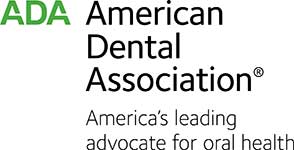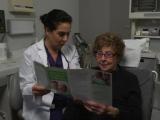Contact:
Julia Nissim
[email protected]
312.440.2807
Simple, Routine Dental Care Matters for Seniors and the Elderly
In fact, a recent article in the Journal of Dental Research found that very elderly adults (ages 85 and older) in community-living settings who slept in dentures were at a higher risk of developing pneumonia because bacteria from the mouth could be inhaled into the lungs.
The American Dental Association (ADA) advises all people–those young and young at heart–that bacteria that is allowed to linger in the mouth can cause tooth decay, gum disease and tooth loss, which is why good dental health is important at any age. For the elderly, and some seniors, caretakers can make all the difference in helping them to maintain healthy dental habits that can also benefit overall health.
Here are the ADA’s top dental tips for seniors and their caregivers:
- Brush twice a day with a fluoride toothpaste, plus floss teeth once a day. If arthritis or dexterity is an issue, an electric toothbrush may be helpful.
- Clean dentures and gums daily; always remove dentures at night.
- Eat a healthy diet.
- Schedule and keep regular dental visits.
- Talk to the dentist about the signs and symptoms of dry mouth, which can be caused by medications, and may lead to tooth decay.
- Ask your dentist for written instructions about any specific at-home care routine that’s recommended for easy reference at home.
- Look for dental products with the ADA Seal of Acceptance. When you see the ADA Seal on a package, you can be sure the product inside has been scientifically evaluated to be safe and effective.
For more information on dental health tips for seniors, please visit MouthHealthy.org and click the “Adults Over 60” tab.
Editor’s Note: Reporters are invited to follow the ADA on Twitter @AmerDentalAssn
###
About the American Dental Association
The not-for-profit ADA is the nation’s largest dental association, representing more than 158,000 dentist members. The premier source of oral health information, the ADA has advocated for the public’s health and promoted the art and science of dentistry since 1859. The ADA’s state-of-the-art research facilities develop and test dental products and materials that have advanced the practice of dentistry and made the patient experience more positive. The ADA Seal of Acceptance long has been a valuable and respected guide to consumer dental care products. The monthly The Journal of the American Dental Association (JADA) is the ADA’s flagship publication and the best-read scientific journal in dentistry. For more information about the ADA, visit ada.org. For more information on oral health, including prevention, care and treatment of dental disease, visit the ADA’s consumer website MouthHealthy.org.
Video B-roll Package
MPEG-4 Video

Related Links
Concerns – Seniors over 60 years oldMouthhealthy Website





